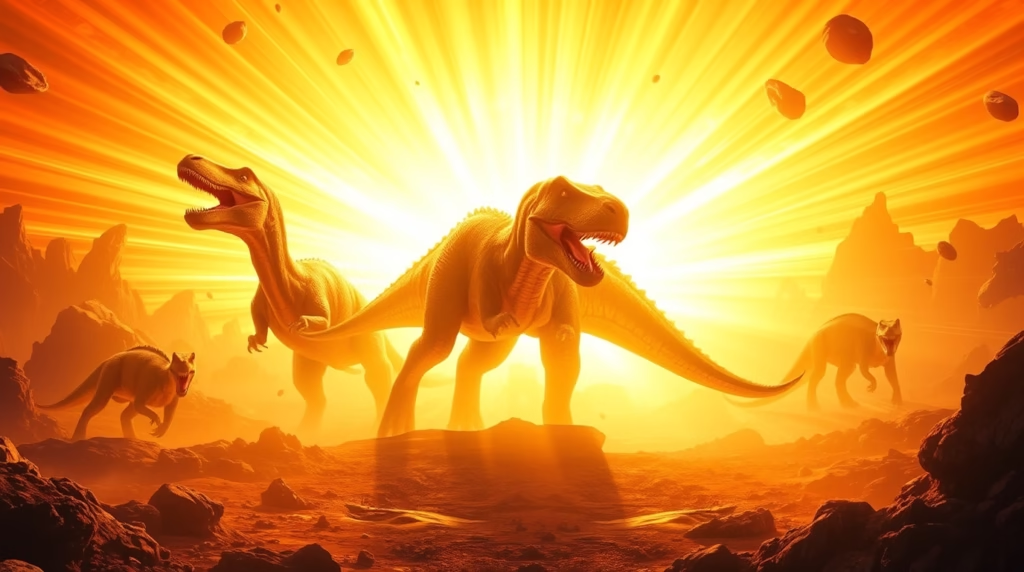The Dinosaur Dynasty: A World Without Asteroid Impact
Imagine a world where the cataclysmic asteroid, the harbinger of extinction, never collided with Earth 66 million years ago. A world where the reign of the nonavian dinosaurs continued unabated. This hypothetical scenario, while fascinating, prompts a cascade of questions: Would these majestic creatures have sustained their dominance? Could they have adapted to the planet’s ever-changing climate? And most importantly, what would become of our own evolutionary lineage?
For 165 million years, dinosaurs thrived, adapting to fluctuating sea levels, extreme temperatures, and volcanic upheavals. Their resilience was undeniable, a testament to their evolutionary prowess. Had the asteroid veered off course, paleontologists suggest a continuation of this reign. Steve Brusatte, a professor of paleontology at the University of Edinburgh, emphasizes the robust diversity and abundance of dinosaurs at the time of the impact, indicating their continued success.
However, the absence of the extinction event would have fundamentally altered the trajectory of mammalian evolution. The small, rodent-like mammals that coexisted with dinosaurs would likely have remained confined to their ecological niches, their potential for diversification and growth severely limited. The opportunity for mammals to evolve into larger, more complex forms, ultimately leading to the emergence of primates and humans, would have been drastically curtailed.
Climate Adaptation: A Dinosaur’s Resilience
One crucial aspect of dinosaur survival would have been their ability to adapt to changing climates, particularly the onset of ice ages. While the majority of dinosaurs were adapted to warmer climates, some species, like those found in polar regions, already possessed adaptations for colder environments. Brusatte suggests that many dinosaurs, particularly those with feathers, could have effectively insulated themselves against frigid conditions, similar to mammals. Furthermore, the discovery of warm-blooded dinosaurs, such as Tyrannosaurus rex, indicates a physiological capacity to regulate body temperature, providing a buffer against environmental fluctuations.
The evolution of woolly coats in mammoths during the last ice age provides a compelling analogy. Dinosaurs, given sufficient time, could have undergone similar evolutionary adaptations, developing physical traits to withstand extreme cold. The ability to adapt to changing environmental conditions would have been paramount for their survival in a world experiencing dramatic climatic shifts.
Intelligence and Evolution: The Dinosauroid Debate
The question of dinosaur intelligence has long captivated the imagination of scientists and the public alike. Dale Russell’s thought experiment, proposing the evolution of a sentient dinosaur, the “dinosauroid,” based on the troodontid dinosaur, sparked considerable debate. Russell’s hypothesis rested on the troodontid’s relatively large brain, stereoscopic vision, and bipedal stance, suggesting the potential for human-like intelligence.
However, subsequent research has largely dismissed the dinosauroid concept as unrealistic and anthropomorphic. A 2023 study concluded that no dinosaur lineage possessed the potential to evolve primate-like intelligence. Nevertheless, the intelligence of modern-day birds, the direct descendants of the species, provides insight into their cognitive capabilities. Birds possess a high neuron density in their brains, surpassing that of mammals. While the possibility of birds achieving human-like cognition remains speculative, it underscores the potential for advanced cognitive abilities within the dinosaur lineage.

Mammalian Fate: A World Without Human Ancestors
The most profound consequence of a dinosaur-dominated world would have been the stagnation of mammalian evolution. The absence of the extinction event would have prevented the ecological vacuum that allowed mammals to diversify and flourish. Paul Sereno, a paleontologist at the University of Chicago, emphasizes that human evolution would have been impossible in a world dominated by large nonavian species.
The 2021 study highlighting the role of the raptor extinction in facilitating primate evolution reinforces this notion. The extinction of land-dwelling raptors, and potentially a competing group of mammals, created the ecological space for our primate ancestors to thrive. Without this pivotal event, the evolutionary path leading to humans would have been irrevocably altered.
A Divergent History: The Unwritten Chapters
The absence of the asteroid impact would have rewritten the history of life on Earth. The dinosaurs, with their inherent adaptability and evolutionary potential, could have continued their reign, shaping the planet’s ecosystems for millions of years to come. Mammalian evolution, however, would have been significantly constrained, preventing the emergence of large, complex mammals, including humans.
The world without the asteroid would have been a world of towering dinosaurs, a landscape dominated by their diverse forms and ecological roles. The intricate tapestry of life would have unfolded in a dramatically different manner, with the absence of humans leaving a void in the narrative.
The hypothetical scenario underscores the delicate balance of life and the profound impact of chance events. The asteroid impact, while catastrophic, inadvertently paved the way for the rise of mammals and the eventual emergence of humanity. It serves as a reminder that our existence is not inevitable, but rather a product of a series of contingent events that shaped the course of evolution.
for more news like these || Visit BB